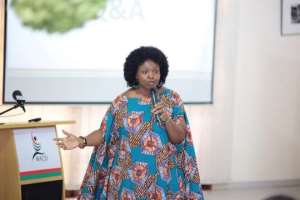
The West Africa Civil Society Institute (WACSI), on Thursday unveiled its five-year strategic plan dubbed; 'Enabling Social Transformation through a Robust and Vibrant Civil Society,' for the period 2018 to 2022.
The strategic plan is based on four thematic areas: Creating Enabling Environment for Civil Society, Civil Society Sustainability, Women and Youth Leadership and Technology for Development.
Ms Nana Asantewa Afadzinu, the Executive Director, WASCI, speaking at the launch said the vision of WACSI is towards peaceful and prosperous West Africa.
She said WACSI seeks to strengthen civil society in West Africa to be responsive, collaborative, resilient and influential through knowledge sharing, learning, connecting and influencing.
She said WACSI would create spaces and platforms for diverse groups of civil society to connect, share and learn from each other and with non-civil society actors.
She said their approach would focus on facilitating multi-stakeholder engagement on critical issues, strengthening civil voices and linking networks and alliances.
Ms Afadzinu said WACSI would curate knowledge and facilitate learning and participatory knowledge sharing within civil society and between civil society organisations.
'We will influence institutions, policies, legislation and funding practices to ensure civil society in West Africa has an enabling environment in which to operate,' she said.
She said within the next five years, WACSI would seek a sustainable and diverse revenue stream to fund planned programmes and organisational development.
She said the role of civil society in the sub-region could not be over emphasised; stating that 'civil society and the role they play is critical and if we have a weak civil society it affects our development in the sub-region'.
Mr Justice Emile Short, a former Chairman of the Commission for Human Rights and Administrative Justice (CHRAJ) and WACSI Board Chair, who chaired the launch, said WACSI exemplifies excellence.
He further urged Ghanaians to support the work of civil society organisations in order to enhance Ghana's socio-economic development.
The WACSI seeks to give particular attention to strengthening the agency of women and youth in recognition of the central role they should play in the transformation of the sub-region.
It also seizes the opportunity that technology is offering in opening up the space for civil society engagement in West Africa.
The WACSI was established by the Open Society Initiative for West Africa (OSIWA) in 2005 to reinforce the capacities of civil society in the sub-region; the Institute became operational in July 2007.




 Dumsor: Don't rush to demand timetable; the problem may be temporary — Atik Moha...
Dumsor: Don't rush to demand timetable; the problem may be temporary — Atik Moha...
 Space X Starlink’s satellite broadband approved in Ghana — NCA
Space X Starlink’s satellite broadband approved in Ghana — NCA
 2024 election will be decided on the grounds of the economy; choice of running m...
2024 election will be decided on the grounds of the economy; choice of running m...
 Dumsor: We're demanding less; just give us a timetable — Kwesi Pratt to ECG
Dumsor: We're demanding less; just give us a timetable — Kwesi Pratt to ECG
 Do I have to apologise for doing my security work, I won’t – Simon Osei-Mensah r...
Do I have to apologise for doing my security work, I won’t – Simon Osei-Mensah r...
 All my businesses have collapsed under Akufo-Addo — NDC Central regional chair
All my businesses have collapsed under Akufo-Addo — NDC Central regional chair
 Military, Prison Officers clash in Bawku, three injured
Military, Prison Officers clash in Bawku, three injured
 GRA-SML contract: MFWA files RTI request demanding KPMG report
GRA-SML contract: MFWA files RTI request demanding KPMG report
 Court threatens to call second accused to testify if NDC's Ofosu Ampofo fails to...
Court threatens to call second accused to testify if NDC's Ofosu Ampofo fails to...
 Family accuses hospital of medical negligence, extortion in death of 17-year-old...
Family accuses hospital of medical negligence, extortion in death of 17-year-old...
